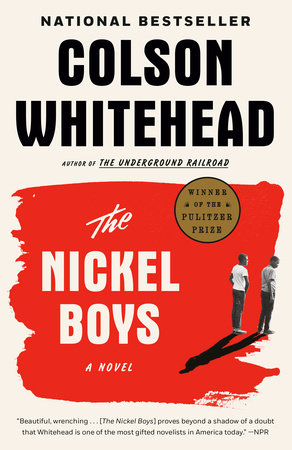
Having spent five years studying the baroque writing of Cormac McCarthy –
the high register, the biblical language, the extraordinary range of allusions
and references, I have come to cherish simplicity in writing. True descriptive
power does not derive from language used but from emotions evoked.When an author
disappears into his or her text, so that only the story remains, this is
something alchemical, something wonderful. What happens is that the reader is
absorbed into the narrative, lives it, picks up its resonances.
Colson Whitehead is such an author. His use of language is exceptional:
he tells his story in crisp, clean language, just the facts, ma’am, and we, the
readers are left numbed, not because of an overstraining for effect or impact,
but because we have been forced to confront the world of another person, a
world wholly different from ours, a world that is hostile and dangerous and cruel.
The narrator of The Nickel Boys is a young boy called Elwood
Curtis. Elwood is very clever, very moral and very hard-working. He has
ambitions and he has the drive to achieve them. Unfortunately for Elwood, he is
also black, in 1950s Florida, where Jim Crow still holds sway and life for
black people is impossibly tenuous.
Elwood achieves a scholarship to a good school and, curious, decides
before school starts to vist this place which is going to shape his future. He
accepts a lift from another young black man, but they are pulled over by the
police and the car is found to be stolen. This being 1950s Florida, and Elwood
being black, he is sent to reform school, his hopes for the future in tatters.
What unfolds in the reform school is horrific beyond words. Whitehead
models his fictitious Nickel Academy on the real Arthur G Dozier School for
Boys in the small panhandle town of Marianna in Florida. In 2012, during an
archaeological excavation, dozens of unmarked graves were discovered. What
emerged in the subsequent investigation was a hideous story of a brutal regime
in which boys were routinely and horrifically tortured, raped and beaten, many
to death. Their bodies were discarded like so much garbage.
The school only closed in 2011.
Whitehead uses this ghastly truth to fashion an extraordinary fiction. The
boys of the reform school are subjected to a regime of abuse which is as unpredictable
as it is horrifying. Intially, Elwood thinks if he behaves and shows himself to
be diligent and conscientious he will flourish, even gain early release. His is
quickly disabused of this and joins the procession of boys through the years
taken in the dead of night to the “White House” for special attention. A giant
industrial fan is used to drown out their screams. Those who can’t sustain the
beatings are tossed into unmarked graves, never to be mentioned again.
It was William Faulkner (or at least one of his characters) who said: “The
past is never dead. It isn’t even past.” This world-haunted view is, of course,
particularly apposite for the American south as it struggles to reach a
compromise with its past. Faulkner himself experienced similar struggles, most
catastrophically in a drunken interview in 1956 in which he argued that the
pace of desegregation needed to be slowed or they would “be back in 1860”, that
is, at the start of the secessions which led to the American Civil War. More,
he stated that if it came to Mississippi versus the United States, “if I have
to make the same choice Robert E. Lee made then I’ll make it.” Although he
quickly distanced himself from these remarks, the uncomfortable truths they
contain remain. There is still a deep-rooted conservatism in the American south
(and elsewhere) in which racism is not necessarily overt, but it exists all the
same. More than that, it is systemic.
To go back to my one sentence paragraph earlier: “The school only closed
in 2011.” Think about that. We are decades from the civil rights movement and
Dr King and the long march to freedom. Desegregation has been dismantled. Civil
rights have been won. Equality has been enshrined in law.
Has it really?
What this deeply unsettling novel tells us is that hidden in full view
such atrocities persist. Being a young, black man is still a dangerous condition
in many places. The life chances of that young, black man – and woman – can be
shattered as easily today as they were in the 1960s of Elwood Curtis. Ask
George Floyd. Ask Michael Brown. Ask Eric Garner. Ask Freddie Gray. Ask Sandra
Bland. Go back to 1955 and ask Emmett Till. Turn on the news today and ask
Jacob Blake, paralysed after being shot seven times while walking away to his
car.
There are just too many to ask.
The Nickel Boys is a confession. But it is the confession of a country
and a society still to understand what that confession means.
Or what to do about it.
.
No comments:
Post a Comment